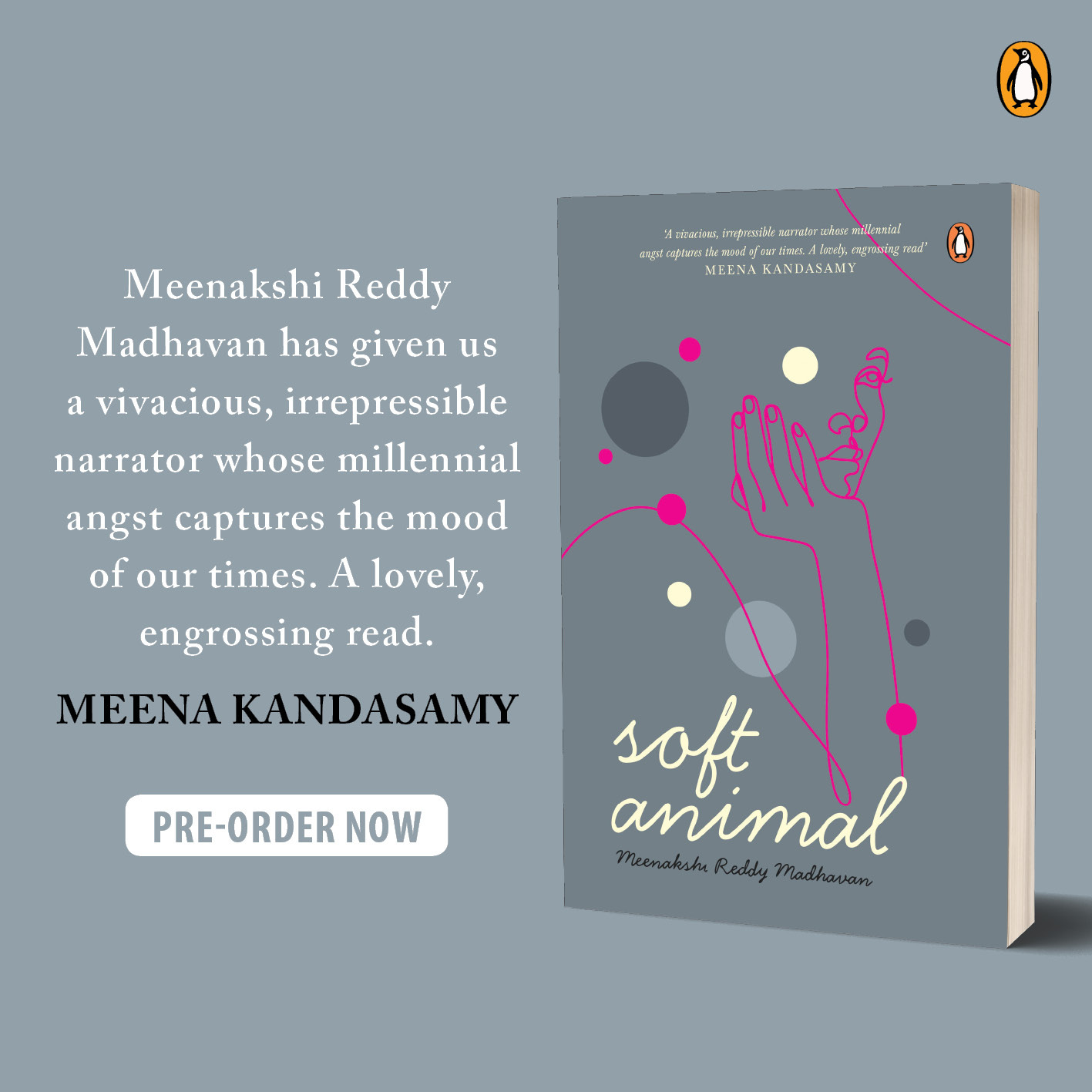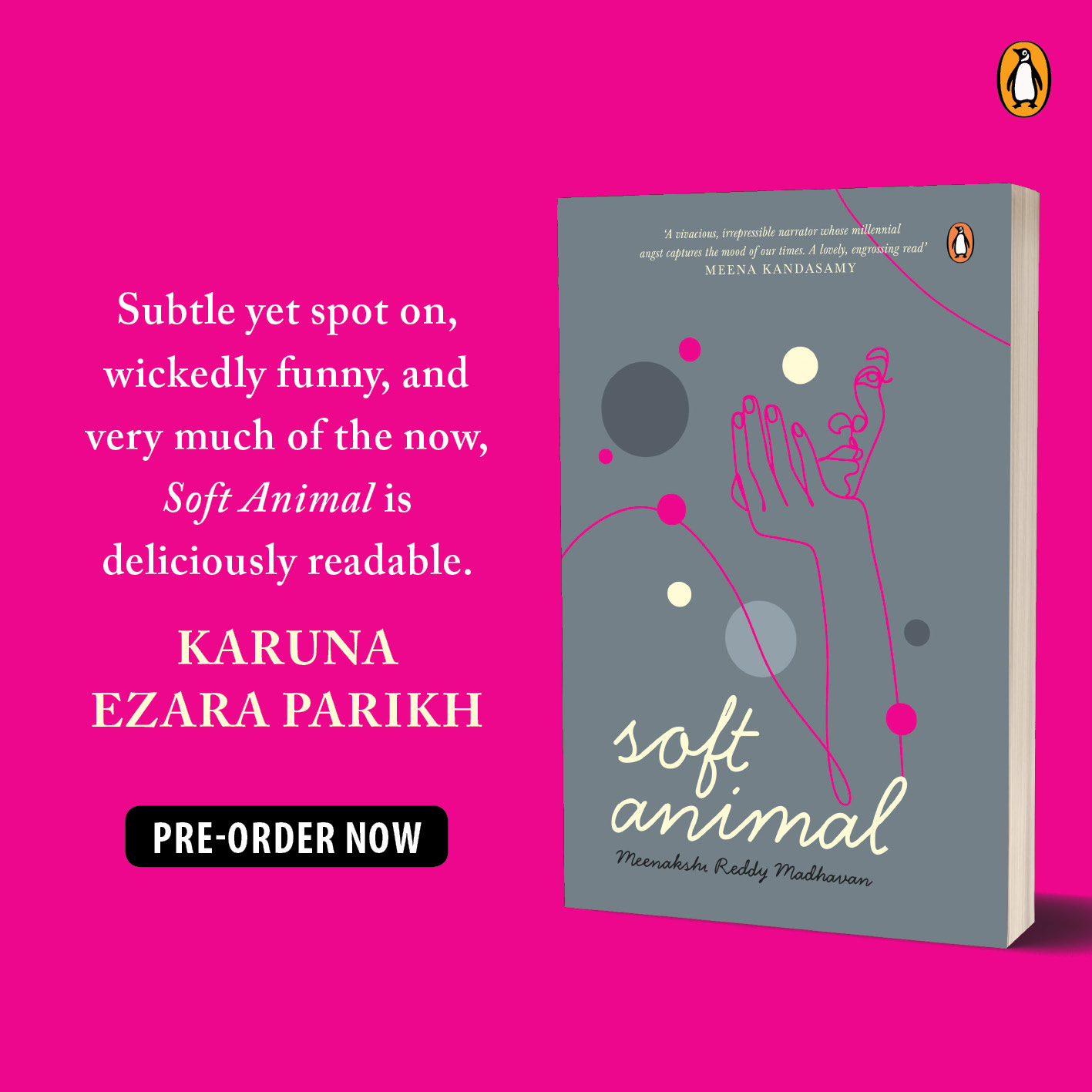Dearest daffodils,
It’s out! The book I wrote during the pandemic and then worked on for a few years after, finally now, in the third anniversary of the lockdown is available on thankfully non-lockdown-ed shelves.
Almost all bookstores across India stock it. (If they don’t, please let me know and I’ll fix it.) It would be very helpful if you were to actually go to a store and ask for it, space being limited, shops often only stock what’s “in demand” and only reorder books once the first lot of 3 or 4 sell out. Readers outside India, I have no good news for you yet, however, if you still have a Kindle India account, you can buy it wherever you are. I’m not in India to sign copies right now, although if you email me, I can send you a digital personalised inscription you can print out and stick to the front of your book, because we’re super modern like that. (Reply to this newsletter or meenakshimadhavanATgmailDOTcom.)
Of course, if you’re super busy and just don’t go to bookshops any more, here is the link to *sigh* Amazon as well. I hate linking to them because they offer hefty discounts where almost all of the discount is straight out of the author’s pocket, HOWEVER, they are extremely convenient, so don’t feel guilty, I do it all the time as well.
I’d recommend you get a physical copy because it has these really cool footnotes that are more fun to read on paper, but of course, they’ve done wonders with the ebook version as well, and shelf space is valuable.
If you are buying it off Amazon, could I ask that you leave me a review as well? This bumps up the book in the algorithm and makes it more visible in search results. A totally honest review, of course. We’re not in the book praising business, only honest critiques.
Anyway, that’s my selling done for now. Expect to see a little reminder about the book in the intro section of this newsletter for a while, but no other news unless it’s really exciting.
Observations
-
I was recently thinking about this guy I used to know. Not know-know, but just know. We were friends, I went to his house for a few parties. I don’t know what brought him into my mind, I recall when I thought of him, sitting on a sofa, watching Indian Matchmaking—oh yes, it was one of the people on the show. He didn’t physically resemble this guy from my past at all, but something about the way he was talking triggered the memory. Anyway, I realised it had been a good fifteen years since I had heard anything of him, which would not be so unusual had I not been acquainted with lots of our common friends. How do some people vanish so completely from our lives? Is the severing of our connection a physical act, as though we are attached by string and it’s cut with scissors or is our connection more like a chalk line which fades away, blown away by the wind and when it isn’t refreshed, just vanishes, leaving no trace at all?
-
Connected: we are throwing our first Berlin house party. Or our first “official” Berlin house party, we’ve had smaller groups over before and last winter, right before I left, I invited some people to a bar and they came over after. This will be a party with food that I will cook, and people that I would like to befriend. Some are, of course, already friends of that special quality you only get in your late thirties and early forties with other people in your same circumstances. You become close, but you realise you have life and work and boundaries and so the closeness has mutual respect and regard for each other’s time, and yet so many years of stories to catch up on! So much to delight in!
-
How do you make friends in a new city is a question that comes up a lot on Facebook groups and the Berlin subreddit, and the answers are usually, “Join some sort of sports team” or “have a hobby.” And these are great answers! I just hate sports and my hobbies are solo ones: reading, art, watching TV, not a lot of group participation there. But really, it’s mostly about swallowing your pride. If you meet someone you like, you ask for their number. You message them, once, twice, thrice (maybe not all in the same week, there’s a balance between enthusiastic and stalker.) You arrange all the meetings, offering plans and times. You go to them. You put yourself out there. And sooner or later, you’ll have a friend who will also make plans with you. A bit like dating, but there’s no “wait for three days to call them back.” I say message them immediately saying how much you enjoyed your time together and making a tentative plan to meet again. Invite them to a party even. Now as to how you meet this interesting person into whom you will be pouring your effort, for that you might have to try hobbies or sports. (Sorry.) (I also have two good friends here but with whom I share Delhi connections so I got lucky in that regard.) People enjoy being liked and admired especially in a platonic way, so if you’re open about your liking and admiration I don’t see why you couldn’t be surrounded by people in your new city.
-
I wonder what it is that divides a city into blocks, so you’ll never leave your own neighbourhood if you don’t have to. Bombay had it, and I put it down to traffic, people don’t want to spend an hour on the road just to meet someone for drinks in another suburb, so you have friends limited to your area. (And why a Colaba woman might never date that lovely person in Malad.) Delhi also has horrific traffic, but somehow all of South Delhi is a monolith, you hop in your car (or an Uber) and travel ten-fifteen kilometres within South Delhi but somehow if it’s North or West, it’s “too far.” Berlin is very kiez-y (kiez = neighbourhood.) It’s almost a joke, but also not. Since we live in Friedrichshain (East, where a lot of your favourite clubs are, rapidly gentrifying but still refreshingly ugly) we are wedded to it. Luckily for us, there’s lots of reasons to explore other parts: the Turkish food is much better slightly to the West of us, a lot of friends live elsewhere etc, otherwise we’d never get out of our particular pocket. A lot of people in Berlin never do. It’s like a curse, a well appointed kiez.
-
Although finding a place to stay is half chance and half arranged marriage. There’s a good reality show idea for you: Berlin Househunting! Anyway, we weren’t really given much of a choice as to street and locality, we went to a bunch of viewings, saw a bunch of places and we were approved for this one (second on the list, but the first people got someplace else and dropped out.) It’s been lucky, I have a good friend who is my neighbour, two train stations almost equidistant to the house, four supermarkets from very cheap to fancy organic, lots of bars and a trendy area a ten minute walk away which is ideal because then people don’t wake you up by partying underneath your windowsill. [Also five Indian restaurants on this road alone but we avoid them, they cater to German tastes and are about as Indian as a Coronation Chicken sandwich.] [The restaurants are, on the whole, pretty average as I’ve said before. Not in all of Berlin, of course, there are some lovely places to eat, but in this area I haven’t found much to blow me away.]
-
So many times in the last three months I’ve found myself stopping and going, “Oh huh I’m living my regular life.” After a year and a half of back and forth between India and Germany, I’d gotten kind of used to constant motion. No sooner had I settled down in one spot than I’d be off again, no sooner were my groceries from India used up than I’d be able to buy new ones again. What I’m saying is this life, the one I’m leading right now, it always felt transient, temporary. Like I was just taking a break from my life in Delhi. We didn’t even have pictures on the wall. It was like the cats and K and me, we were all just taking a break from our regular programming. Sometimes I’d even feel jealous of the cats, like how they get to stay in our house all the time and I have to keep leaving. A few days ago, I bought something online for the first time. Here, I mean. I treated this like my normal life. I have to keep stopping and reminding myself that I don’t have to do everything immediately, that I have a long time to let things unfold. I was joking last time I was in India about how I have a Life A and a Life B, and they keep swapping depending on which country I’m in, and now I’m in Life A, and Life B is on hold. So bizarre but so comforting.
-
I was at this club called Sisyphos the other day, but not in its club avatar, it was actually open during the week as a flea market, which was quite bad. Children screaming everywhere, overpriced goods, but we (my two friends and I) had a drink and a snack and then walked home by the river, which was lovely and had a spectacular sunset. While we were waiting in line for pizza (other option: bao-burgers, which were very small and didn’t look that nice), we started talking about the German word “vielleicht” and how it sounds almost like Hindi. (Pronounced ‘fill-highsht’ I realised much later that it sounds like ‘filhaal’ which is ‘presently’ in Urdu and not at all the same meaning as vielleicht means “perhaps” but the same sounds sorta.) There was a woman behind us in the queue, German, our age, perhaps younger, and she began by saying, almost angrily, “Excuse me, are you [something] [maybe she used the word ‘upset’? I’m not sure] that German is not the same as Hindi?” So of course we laughed and clarified, but she took this as a way to, I don’t know, interrogate us about India, but in the most ignorant way. She wasn’t racist, I don’t think, but she was quite stupid. She seemed to get stuck most of all by the fact that all three of us were speaking English. “You’re from India and you’re speaking English!” she kept saying. At this point, I got bored and turned away from her to examine the slices, but my friend, with more patience than I, tried to explain about many different languages, blah blah blah but this chick would not stop with the, “omg how is English all of your [as in us three] first language?” I don’t expect people to know a lot about India (even though it’s a very large country and a little knowledge never killed anyone) but the confidence with which this woman just waded in to a private conversation between three people and displayed her ignorance was just baffling. And how she didn’t seem to pick up on any social cues either, just merrily being like, “OMG DO YOU GUYS HAVE ELEPHANTS?” (Not really, I’m only joking, but you know what I mean.)
-
There is, I have heard, the occasional very mean racist person in Berlin that one encounters, but on the whole this is a pleasant open-minded city which is extremely diverse and also pretty safe for your lone woman walking home by herself, which is a TREAT. These days I’ve got a Stephen King audiobook I borrowed via my library app and I just get out and walk for about 30-45 minutes, listening to the story, just wandering about, making the streets my own. It’s really nice.
On that note, I end. I just poured myself a glass of wine (7 pm and I’m alone at home writing this to you, the sun’s just come out after a long cloudy day) and I’m thinking of you reading this at whatever time it is for you. I hope you’re also well and happy.
Currently reading:
I’ve been in a huuuuuuge reading rut, so literally all I’ve done recently is re-read Marian Keyes, but yesterday I went to my own shelves and pulled out Midnight In the Garden of Good and Evil which is beautiful narrative non-fiction about the American South, specifically Savannah, where the author had to put a little note in going, “hey btw this is non-fiction and not a novel.” I too would like to visit Savannah.
Today my friend wanted to go to a few bookstores so we walked to the Berlin Shakespeare and Sons (not related to the Paris one, I asked) where instead of just looking at the books, I actually bought one (SO EXPENSIVE HERE) but this was one I wanted in print and to own. It’s collected German stories and essays but with the English translation on one page and the German on the other. Very cool, and nice stories as well.
We also stopped at a little cafe I know of which sells all their second hand books for 2 euro, and has a sizeable English collection. I bought:
Mutton by India Knight (hilar.)
The Collector by John Fowles (re-read but TERRIFYING, I don’t know what possessed me, a woman who is enjoying walking around on her own, to purchase this book that is a cautionary tale for women who walk around on their own. One of the scariest books I’ve ever read, keen to see if it still scares me since I’m somewhat inured to that sort of thing now.)
Some Hope by Edward St Aubyn (have wanted to read the Patrick Melrose books for a while. Enjoyed the first in a ‘this is good writing’ way not in a ‘great story’ way, because again it’s quite desperate, and this is a trilogy.)
The Last September by Elizabeth Bowen (looked nice, I like her.)
The Wizard of Earthsea by Ursula Le Guin (is that one word or two? Re-read, wanted to own it.)
What have you bought and/or read recently? (Besides my book OBVIOUSLY!)
links links links
Quite a sad antivaxxer story.
India’s beef with beef.
Inside the temple of Sadhguru. (I mean, I think the journo went with zero Sadhguru context, so this story is quite tame, but it’s an interesting insight into one of his American retreats.)
On pretend cooking.
A great essay on Grey’s Anatomy. (which K keeps insisting on calling “Grey’s Academy” which is… close.)
And that’s all I’ve got! Remember to drink lots of water and also, yes please, buy my book.
xx
m
Who are you? Meenakshi Reddy Madhavan, writer of internet words (and other things) author of seven books (support me by buying a book!) and general city-potter-er.
Follow me on Twitter, Facebook and Instagram. (Plus my book recommendation Instagram!)
Forward to your friends if you liked this and to people who keep asking you dumb questions if you didn’t.
Also, write back to me! I love to hear from you.






